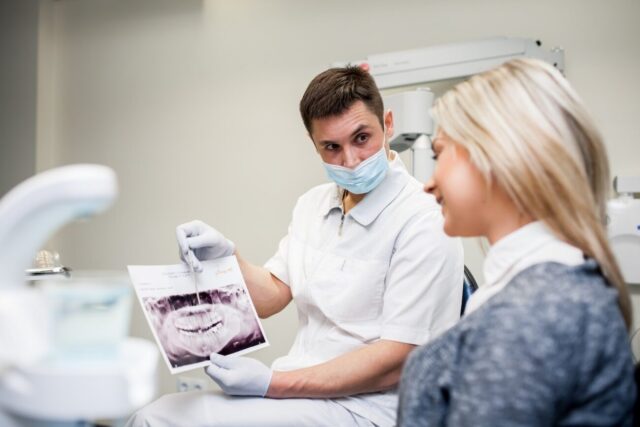
Recovering from dental implant surgery can be a challenging time, not just physically but also nutritionally. It’s crucial to ensure your body receives the right nutrients to heal efficiently, but this can be tricky when your usual eating habits are disrupted.
That’s why we’ve compiled this comprehensive guide, blending expert dental advice with nutritional know-how, to support your journey to recovery. From understanding the healing process to delicious, mouth-friendly recipes, we’ve got everything covered. Let’s embark on this journey to a healthier smile and a stronger you.
Understanding Dental Implant Recovery
Dental implant surgery, while highly successful, involves a significant recovery period. Initially, you may experience swelling, bruising, and discomfort, which is a normal part of the healing process. Your dentist will likely recommend a diet of soft foods to avoid putting pressure on your new implant.
During this time, it’s essential to maintain good oral hygiene and follow any specific instructions provided by your dental professional. Understanding that healing is a gradual process can help you set realistic expectations and reduce anxiety.
After getting dental implants, it’s crucial to focus on soft foods that are easy to eat and packed with nutrients to aid in your recovery. Your diet should include items that are high in vitamins A and C, which contribute to the healing of soft tissues and the prevention of infections.
Additionally, foods rich in calcium and phosphorus are vital for bone health and implant integration. Ensuring adequate fluid intake is also essential to stay hydrated and supporting overall health.
Recipe Ideas for Healing

Start your day right with nutritious and implant-friendly breakfast options. Soft scrambled eggs, enriched with cheese or spinach, provide a good source of protein and vitamins while being gentle in your mouth.
Smoothies are another excellent choice, as they can be packed with fruits, vegetables, and even protein powders, offering a well-rounded meal without the need for chewing. Remember to blend thoroughly to a smooth consistency and consume with a spoon instead of a straw to protect your surgical site.
Lunch and dinner should continue the theme of soft, nutritious foods that support your recovery. Soups and broths can be particularly soothing and are a great way to incorporate vegetables and lean proteins into your diet. Choose creamy soups like butternut squash or tomato basil, which is packed with flavor and easy on your mouth. Ensure they are blended smoothly and served warm (not hot) for a comforting meal.
Managing Pain and Discomfort
While your dental professional will likely prescribe medication to help manage pain and prevent infection, there are additional steps you can take at home to alleviate discomfort.
Over-the-counter pain relievers can be used according to your dentist’s advice, and cold compresses applied to the cheek can reduce swelling and bruising. It’s important to follow the specific guidelines provided by your dental team regarding medication and home care to ensure a smooth and effective healing process.
Natural remedies can also play a role in your recovery, although they should never replace professional medical advice. Rinsing with a warm saltwater solution can help soothe the surgical site and reduce inflammation.
However, this should only be done after the initial healing period (typically 24 hours post-surgery), and as instructed by your dental professional. Gentle oral care practices, such as careful brushing around the surgical site and using a soft-bristled toothbrush, can also aid in your recovery.
Staying Hydrated and Avoiding Harmful Habits

Staying hydrated is essential for overall health, especially after surgery. Water plays a critical role in the healing process by helping to transport nutrients to your healing tissues and facilitating the removal of waste products from your body.
Aim to drink at least eight glasses of water a day, and consider adding slices of cucumber or berries for a refreshing twist. Avoid alcoholic beverages and caffeine, as they can lead to dehydration and may interfere with the healing process. Remember, a well-hydrated body recovers faster and more efficiently.
Supporting Your Body’s Nutritional Needs
Your body requires a plethora of vitamins and minerals to heal effectively. Vitamins A and C are vital for soft tissue repair and immune function, while calcium and vitamin D are crucial for bone health.
Zinc plays a role in wound healing and immune system function. Incorporate foods rich in these nutrients into your post-surgery diet, such as leafy greens, dairy products, nuts, and seeds. Consulting with a nutritionist can provide personalized advice to meet your specific dietary needs during recovery.
Protein is the building block of tissue regeneration and repair. Ensuring you consume adequate protein can significantly impact the speed and quality of your healing process. Soft protein sources such as Greek yogurt, cottage cheese, tofu, and finely shredded meats can be gentle on your surgical site while providing the necessary nutrients.
Smooth protein shakes and bone broths are also excellent options for adding protein to your diet without requiring much chewing.
Mental Health and Recovery

Recovery from dental implant surgery can be physically demanding, but it’s important not to overlook the mental aspect. Stress can hinder the healing process, so finding ways to relax and maintain a positive outlook is crucial.
Techniques such as deep breathing, meditation, and gentle yoga can help manage stress levels. Additionally, ensuring adequate rest and sleep can significantly affect your mental well-being and aid in recovery.
Final Thoughts on Recovery and Care
Regular follow-ups with your dental professional are crucial to ensure that your implant is healing correctly and to address any issues promptly. Adhering to a meticulous oral hygiene routine is also essential to prevent infection and promote healing.
Brush gently, floss carefully, and consider using an antimicrobial mouth rinse if recommended by your dentist. These practices are not only vital for recovery but also the long-term success of your dental implant.
Recovering from dental implant surgery is a journey that requires patience, proper nutrition, and careful oral care. By following these guidelines and working closely with your dental team, you can ensure a successful recovery and enjoy the benefits of your new smile.
Remember, every step you take towards following these recommendations brings you closer to a healthier, more confident you.



